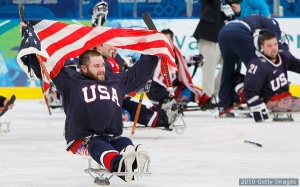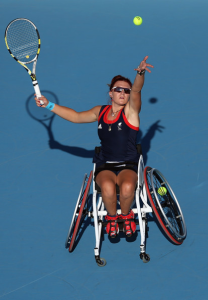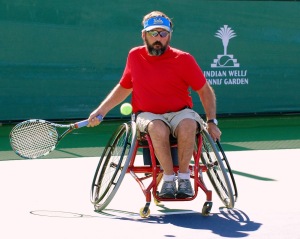This is, perhaps, a bit out of scope for this blog, but on the other hand I am hoping that in the process of writing down these thoughts it would force me to apply some Orthodox phronema to my thoughts and attitudes, and perhaps provide me with a bit of guidance.
I have a genetic bone disorder, known as Osteogenesis Imperfecta (OI). I have type I and a fairly mild case of it. By shortly after my 15th birthday, I had broken a bit over 20 bones. I don’t remember the exact number, but after that I stopped fracturing for another 23 years. Because I was so mild, I really wanted to be normal. It was so close that I always felt that it was right there in front of me. My parents, who had to deal with the results of broken bones – the cost, the challenges to everyones day to day activities, and the difficulty of having a child in pain, ultimately opted to have me stay in a wheelchair throughout much of my childhood. Until fairly recently, I disagreed with that decision. Now I’m not so sure.
In college, I gave up my wheelchair. I put it away and never looked back. I took up boogey boarding and racquetball. I loved being normal. The problem is that I really wasn’t. The risk of subsequent fracture was always there, but pushed out of the way. Only when I attempted to learn to ride a bike, was I reminded of that. My own sense of self preservation made such an effort fruitless, and I ultimately gave it up. As married life, children, and work took up much of my time, I moved away from any form of exercise. I tried tennis briefly, but it was too difficult to run that fast. Again, a bit of fear was in the back of my mind, and perhaps that kept me from more damage. Then, at 38, the fractures started again, in a big way. Now, 11 years, three broken femurs, one crushed tibia, and numerous stress fractures later, things are a bit different. Along the way, I did finally get a bike. Well, actually, a trike. Fortunately it was pretty cool looking, so I didn’t feel quite so abnormal. Lots of “normal” folks ride them too, and that was important to me.
This year, I had an epiphany. It was a bit slow in the making, but once it hit, well…
It started with the 2014 paralympic games in Sochi. There was an event I had never heard of before called sled hockey. And there was a member of the US team with OI, named Taylor Lipsett. He had the same type as I did, but appears to mostly break legs. He largely used a wheelchair for day to day activities. In hindsight I suspect that this is because the risk is too high to walk about. If he breaks a leg, he won’t be playing hockey for a while. Why take that risk? He accepted that he wasn’t normal. There is absolutely no way he could ever play standard hockey. Instead he opted to accept who he was and what he had and chose to become an international class athlete. He has achieved more being disabled than he would have had he attempted to be normal. In other words, he accepted who he was, and worked with that.
How does this apply to Orthodoxy? Orthodoxy is all about transformation. Leaving the fallen state that we are in to become
deified, to become one with God. It is very much not about accepting our limitations. Isn’t that the opposite of what Taylor did? Not at all. His limitations are real, and there is nothing he can do about them to make them go away. He has brittle bones, and, for the time being, nobody has developed a means to make that go away. So his choice is to either accept that and simply never develop his physical talents, or to accept that and, through it find a means to develop his talent. Like the parable, he can either bury the talent, or put it to work. By accepting his weakness, he can actually move beyond it. Many of the holy men and women we learn about in the Church, have found in their various physical maladies a means to grow stronger, much like Taylor has in a physical sense. I’ve since met other athletes much like Taylor, including Jordanne Whiley, who also has OI, and, like her father, and Taylor, has decided to accept that and move far beyond the limitations such a disorder can present.
But there is another piece to this. To some degree, you can live in a state of delusion. I refused to use a wheelchair as if by that refusal I wouldn’t have a disability. Instead, I increased my disability – and failed to see the pathway to growth and development of some talents. But then, the epiphany happened. Not very long ago, I decided to accept my disability. I started using wheelchair more often for daily activities, and I took up a wheelchair sport. Now I can do more than I could trying to pretend that I wasn’t disabled. I’ve decided to be who I am, and take that and make it grow, and it has been a world of difference. That is, I think, a more Orthodox way.


